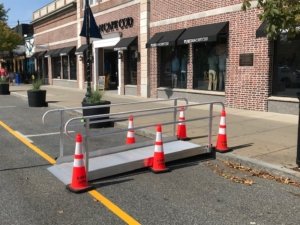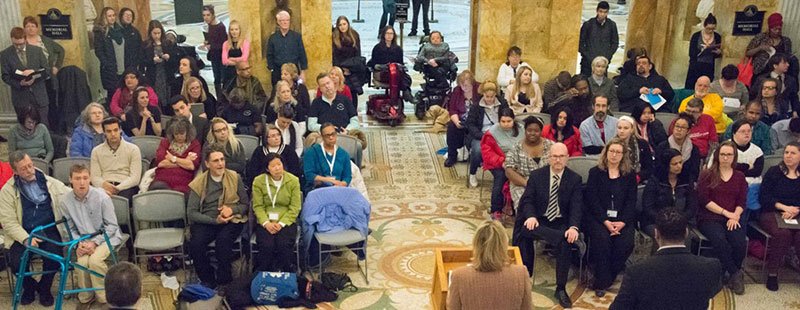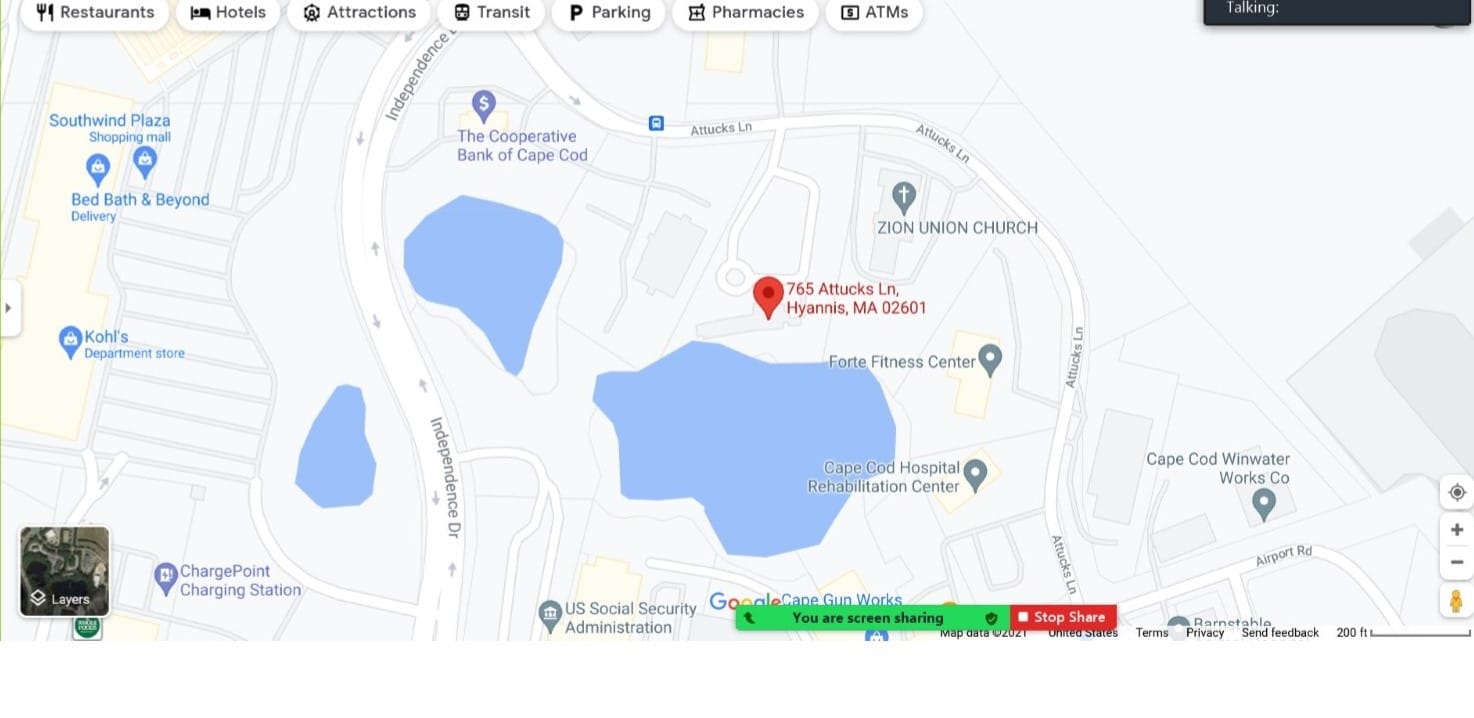
CORD’s Recent Advocacy Efforts
Towns helping businesses during the pandemic is a good thing, but not at the expense of people with disabilities!
When the Town of Barnstable allowed restaurants to expand their seating onto the sidewalks to help them stay afloat during these tough times, they inadvertently blocked access to people who use wheelchairs. The path of travel from the curb cuts were blocked by the restaurants expanded seating. CORD quickly jumped into action and assessed the situation and worked with the Town to resolve the issue. The Town agreed to install portable ramps at all areas that were blocked so that all people, regardless of disability would be able to shop. CORD also reached out to all towns to advise them to watch out for barriers and offered to provide free technical assistance.
Ban plastic straws? Not so fast….. 
While we recognize that single-use plastic straws are a problem for the environment, an outright ban on them will adversely affect many people with disabilities who rely on them. Yes, there are options, but all pose a potential hazard to those who need straws. CORD has jumped on this issue by educating people via social media and mainstream media on the harmful effects that a ban would cause. CORD’s Vice President attended a Board of Health meeting in Sandwich to testify against banning straws in that town and is ready to attend meetings in any other town that mistakenly think that this is the way to go.
The ADA works. Leave it alone!
It seems every year there is a new bill trying to take away the rights of people with disabilities under the Americans with Disabilities Act (ADA) and 2018 was no exception. Congress passed the ADA Education and Reform Act, but the Senate refused to vote on it. Prior to the mid-term elections there was talk that the Senate would tack this bill onto other legislation and pass it prior to any new senators taking office in January. CORD jumped into action by educating people on the devastating effects of this bill and enlisting the help of CORD consumers to join a letter-writing campaign to urge Senator Warren and Senator Markey to support the ADA by not supporting this discriminatory bill.
State law and ADA don’t match? That’s a problem.
Did you know that a business can be in full compliance with Massachusetts access laws but still be in violation of the ADA? CORD has joined with other disability groups across the state to advocate to make Massachusetts Architectural Access regulations align with federal law. It’s better for people with disabilities and it’s better for businesses.
Actually, voting does matter.
There are many barriers to voting but states have been working to remove those barriers with absentee voting, early voting and accessible voting machines. But if people don’t register, all the other solutions won’t make a difference. CORD has joined the REV Up movement to increase the number of people with disabilities who register to vote. Through holding registration days, using social media to inform people with disabilities of the importance of voting and being available to assist people with disabilities who want to register, CORD has been hard at work to help people take that all-important first step to voting.
But there’s more to voting than just registering. Polling sites must be accessible. Over the past several years, CORD has been working with the Massachusetts Disability Law Center (DLC) to ensure that polling sites on Cape Cod are accessible. CORD advocates surveyed 20 polling sites this year alone! We’ve checked on physical access, access to ballots and voting information as well as working accessible voting machines for people who are unable to read ballots. We’ve also spent a lot of time educating people on their rights as voters with disabilities.
Same old story… not enough money to go around.
Every year it’s the same thing – services and programs that people with disabilities rely on don’t get enough funding or get cut. And every year CORD steps up and makes calls to legislators, attends rallies and meetings at the State House and advocates to protect and improve services and programs for people with disabilities. Whether it’s housing vouchers, MassHealth or money for community living services, CORD is there fighting for you.
Helping to improve PCA services.
CORD has been in the forefront of campaigns for improved PCA services, the creation of the PCA Workforce Council, accessible transportation, and affordable and accessible housing, including establishment of the state’s Home Modification program.
Helped establish the CommonHealth insurance program.
Probably the most laudable gain of CORD’s early years was its spearheading of the effort that produced CommonHealth, the nation’s first Medicaid buy-in program for people with disabilities. CORD member Paula Burns lamented in a 1986 meeting that if she went to work, her earnings would make her ineligible for Medicaid, which covered medical essentials that no other insurance plan would touch. In essence, she had a choice between work or necessary health insurance, but not both, ostensibly being penalized for going to work! CORD partnered with CAC and Health Care for All on the buy-in, with CommonHealth becoming law and commencing on July 1, 1988. A highlight was the “Let Us Get to Work!” rally at the State House in 1987, attended by over 300 people. CommonHealth was the prototype for all Medicaid buy-in programs across the country for people with disabilities, allowing thousands to both work and retain invaluable Medicaid coverage.
Battled in Washington for the Americans with Disabilities Act.
During 1989 CORD began a strong, decade-long affiliation with the national disability rights group ADAPT. CORD members participated in major events in the push for passage of the Americans with Disabilities Act, including celebrated actions such as the 1989 action at Philadelphia’s Liberty Bell, and the 1990 Capitol Crawl in Washington and the meeting in the Capitol Rotunda with Congressional leadership that ended with civil disobedience featured in the disability rights documentary that aired on PBS, Lives Worth Living.
Health care activism: getting doctors to accept Medicare and Medicaid.
CORD has been deeply involved in health care activism. Allying with Dick Bigos and the Community Action Committee (CAC), Bill Pastreich and the Hospital Workers Union, and Mabel Canto and Cape United Elderly, the group battled for doctors to accept people on Medicaid and Medicare. This advocacy was marked by hearings and a notable protest in which CORD joined with other groups to take over a 1985 meeting of the Massachusetts Medical Society in Hyannis, demanding that people with disabilities not be discriminated against. Subsequent rulings and laws removed the barrier to care.
Improving disability access on Cape Cod.
CORD was involved in supporting the adoption of a strict handicapped parking bylaw in Barnstable, pushed by Bernie Woodman; Securing expanded B-Bus hours for weekends and evenings – until about 1986 the service ran less than eight hours a day just five days a week; and addressing architectural barriers.
In 1985, nine CORD members tried to cross the street in the middle of Falmouth in their wheelchairs, spurred by Mike Early and Louis Copestick. Because there was no curb cut on the other side, in violation of state code, the procession stopped, as did peak summer traffic. The resulting traffic jam received big media attention, which prompted a major undertaking by Falmouth to improve access while also sparking much access advocacy across the Cape.
Many people and organizations contributed to CORD, including civil rights champions Leo Lucas, Rick McIntosh, Melva Wood Johnson, Fred Zepernick, Kent Killiam, Alicia Walinski, Senator Lois Pines, Representative Tom Cahir, Pam Burkley, Betty Lynch, Lisa Canto, Jim Gleich, Michael Marcus, Pat Ford, Arthur Wood, Debbie Talshir, Kathleen Kelleher, Patty Rodriques, Jim Heffernan, Autumn Daniels, Mike Newhall, Felicity Craven, and Skip Nelson. Sincere apologies are extended to anyone very unintentionally not mentioned.





